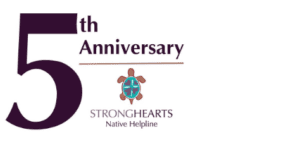Supporting Indigenous survivors of sexual assault Awareness Month
Supporting Indigenous survivors of sexual assault Awareness Month
This April, StrongHearts Native Helpline, the National Indigenous Women’s Resource Center and the Alaska Native Women’s Resource Center recognize Sexual Assault Awareness Month (SAAM) by raising awareness of sexual assault and supporting victim-survivors of sexual violence. Rape and sexual assault are never the victim’s fault. It is crucial that we recognize sexual violence as part of the continuum of violence against Indigenous peoples, and that it is interwoven with colonization, intimate partner violence, missing and murdered Indigenous women (MMIW), trafficking and extractive industries.
Sexual violence can happen to anyone. In Indigenous communities in the United States, more than half of American Indian and Alaska Native women (56.1 percent) have experienced sexual violence in their lives and the vast majority (96 percent) are victimized by a non-Native perpetrator. Additionally, more than one in four Native men (27.5 percent) have experienced sexual violence.
Sexual violence is not traditional. It is a tool and result of colonization, which is responsible for the theft, occupation, resource extraction and exploitation of Native lands that continues to this day. Today, Native Americans who are living in tribal communities on or near lands that are exploited by extractive industries face the highest rates of sexual violence. Culturally, we view any attack on the land — our Mother Earth — as an attack on the lives and bodies of Indigenous peoples. The same government infrastructure — federal laws, policies and institutions — targeting and permitting sexual assault, abuse and harassment of Native women in the 1800s continues to exist in 2022. Removing these structural inequalities requires awareness and transformative action in understanding and advancing changes to end sexual violence. For decades, Indigenous advocates — often survivors themselves — have challenged systemic barriers, policies and laws permitting such abuse to make our communities safer.
The experiences and voices of Native survivors of violence are often ignored and disregarded, leaving many of our relatives without access to medical care, justice, supportive services and healing. Survivors often do not report sexual assault or seek help out of shame, embarrassment or fear of retaliation by the person who assaulted them. Additionally, Native survivors can experience jurisdictional hurdles when they report a crime, and oftentimes, the reports do not result in investigations, prosecution or convictions.
Our cultures are centered around the value of respect and the sacredness of women and children. Historically, sexual violence in our communities was extremely rare because the violent acts were punished quickly and severely. It is time to renew our efforts to end sexual violence and reclaim the honor of Indigenous peoples. The foundation of this work is the lifeways, values, and beliefs of our ancestors. Together as relatives, we will not tolerate sexual violence in Native communities and proactively work to hold perpetrators and systems accountable. Supporting Indigenous survivors of sexual violence is central to ending violence of all kinds/types in our communities.
During Sexual Assault Awareness Month, we join together as relatives to support Indigenous survivors of sexual violence and advocates.
What is Sexual Assault?
Sexual assault is any type of sexual activity or contact that you do not consent to. It may occur within an intimate relationship as a tactic of domestic violence. Sexual assault is a type of sexual violence and is rooted in power and control, a way for perpetrators to instill fear into victims. Forced sexual acts cause great trauma and harm people physically, spiritually, mentally and emotionally.
Types of Sexual Assault:
- Harassing or calling you degrading sexual names
- Fondling, grabbing, or pinching the sexual parts of your body
- Constantly pressuring you to have sex when you don’t want to have sex
- Forcing you to have sex or engage in unwanted sexual activity (ex. rape, anal rape, forced masturbation or forced oral sex)
- Drugging so you are unable to consent to sexual activity
- Using weapons or other objects to hurt the sexual parts of your body
The trauma of a sexual attack on one’s spirit and wellbeing can last a lifetime, particularly if safety, support and culturally based resources for healing aren’t accessible. We know that these services are often not readily available in Tribal and Native communities. For relatives who are hurting, StrongHearts Native Helpline (1-844-762-8483, strongheartshelpline.org) provides peer support and a connection to services as a nationally available domestic, dating and sexual violence helpline designed by and for Native people.
Below you will find more information about Sexual Assault Awareness Month and advocacy resources on sexual assault.
Helpful Resources:
- Register for NIWRC Webinar, The Effects of Climate Change on Gender Based Violence and Indigenous Communities on April 6, from 1 to 2:30 p.m. MDT.
- Join #ProtectHer Twitter Chat on April 22, from 10 to 11 a.m. MDT.
- Inspire action in your community with a proclamation for Sexual Assault Awareness Month.
- Download sexual violence against women and children in Indian Country fact sheet.
- ContactStrongHearts Native Helpline (1-844-762-8483, strongheartshelpline.org) if you or someone you know has been sexually assaulted or abused.
- Read personal survivor’s stories on strongheartshelpline.org
- Join StrongHearts Native Helpline on April 13 for a Tweet Story day where we will be sharing a Native American woman’s sexual violence survivor story. Beginning at 10 a.m. CDT, every 15 minutes we post a Tweet and share her story in her own words.
- Listen to new Speaking Our Truth podcasts
- Episode 15: Featuring StrongHearts Native Helpline
- Episode 16: Featuring AKNWRC
- Read and share Restoration magazine articles:
- Follow and share from NIWRC, AKNWRC’s, and StrongHearts’ social media pages throughout April.
The post Supporting Indigenous survivors of sexual assault Awareness Month first appeared on Native Sun News Today.

